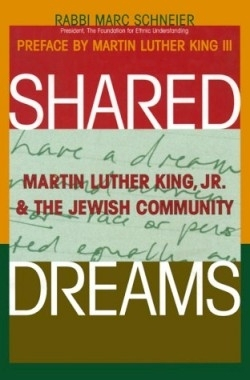Shared Dreams
Martin Luther King Jr. and the Jewish Community
“There has to come a time in my life to prove to myself that I am what I profess to be. I must be counted and I must be visible. My wife shares my convictions. We leave tonight for Alabama. And we are afraid.” This is from a letter written by a Jewish man from Ohio just prior to joining 3,200 others who took part in the voting rights Freedom March from Selma to Montgomery in March, 1965.
It’s but one example-albeit a powerful one-the author cites in his eighteen-chapter work detailing the intertwining relationship between the black leader and the Jewish community. Schneier traces this alliance from the early days of the Civil Rights Movement up to the last year and a half of King’s life, when circumstances made for an uncomfortable and awkward connection. It seemed a natural alliance. As King himself stated as guest speaker at the first American Jewish Congress held in a southern state: “My people were brought to America in chains. Your people were driven here to escape the chains fashioned for them in Europe. Our unity is born of our common struggle for centuries.”
A large number of the leader’s close confidantes were Jewish. Schneier highlights several, such as Rabbi Israel Dresner who was “beaten, battered and arrested” during the summer of 1964 Freedom Rides; Stanley Levison, the New Yorker who helped conceive the idea of the Southern Christian Leadership Conference (SCLC); and Abraham Heschel, Poland-born Hasidic scholar who appeared with King at many events including the Selma-to-Montgomery March. The relationship was uneasy at times, Schneier suggests, because of the friction between local Southern Jewish congregations and their national political organizations. The locals still had to live where segregation existed and would naturally bear the brunt of any later potential violence; the out-of-towners would be out of reach.
The behind-the-scenes machinations are enlightening. The later breaking-away of various support groups-the Student Nonviolent Coordinating Committee (SNCC) eventually deleted the word nonviolent from its name and young, disillusioned blacks joined the newly-founded and more radical Black Panthers-left the Civil Rights movement weakened as donations and support from Jewish groups also faded during disagreements on King’s anti-war stance.
Schneier’s extensively researched treatise is a great addition to the documentation of a time in America’s recent past no one should be allowed to forget.
Reviewed by
Robin Farrell Edmunds
Disclosure: This article is not an endorsement, but a review. The publisher of this book provided free copies of the book to have their book reviewed by a professional reviewer. No fee was paid by the publisher for this review. Foreword Reviews only recommends books that we love. Foreword Magazine, Inc. is disclosing this in accordance with the Federal Trade Commission’s 16 CFR, Part 255.

